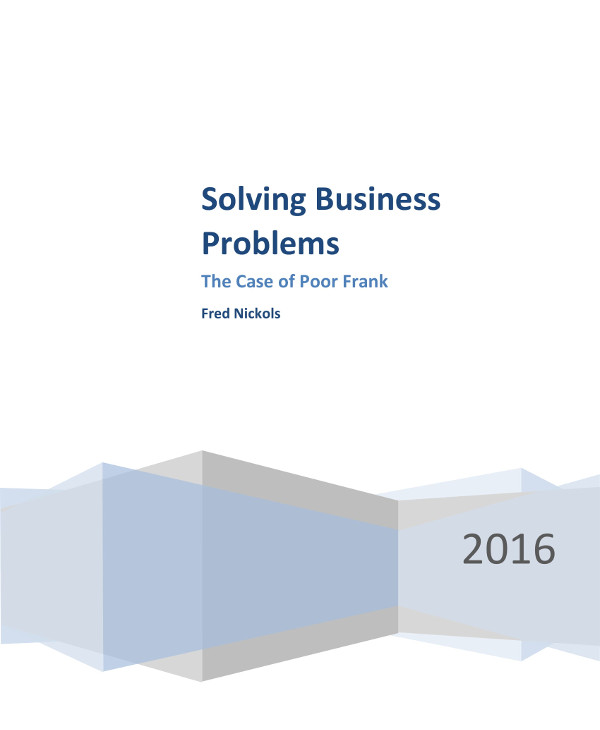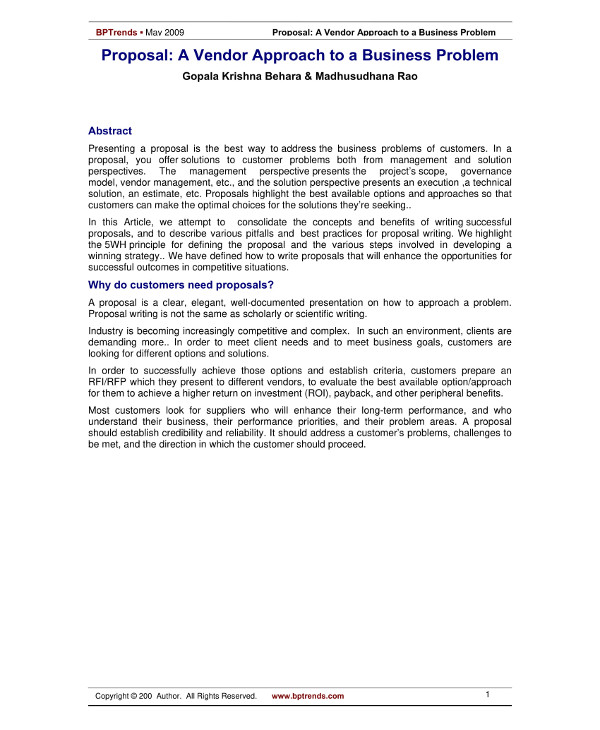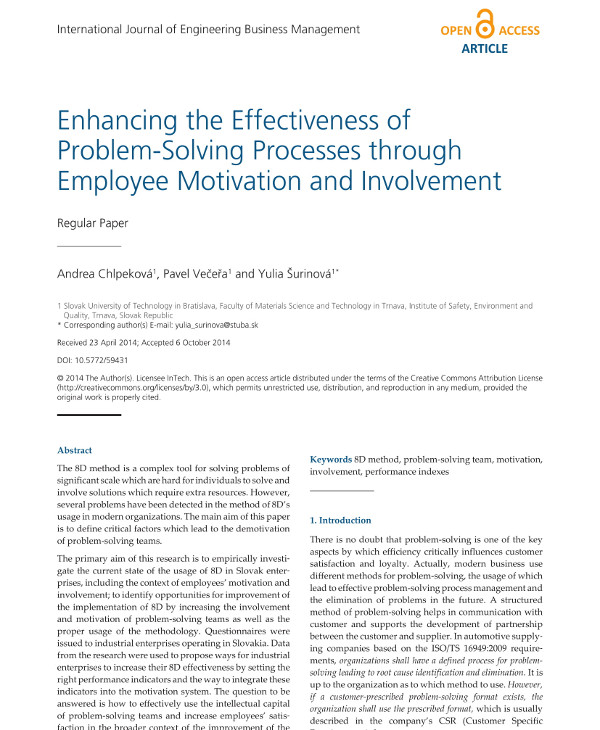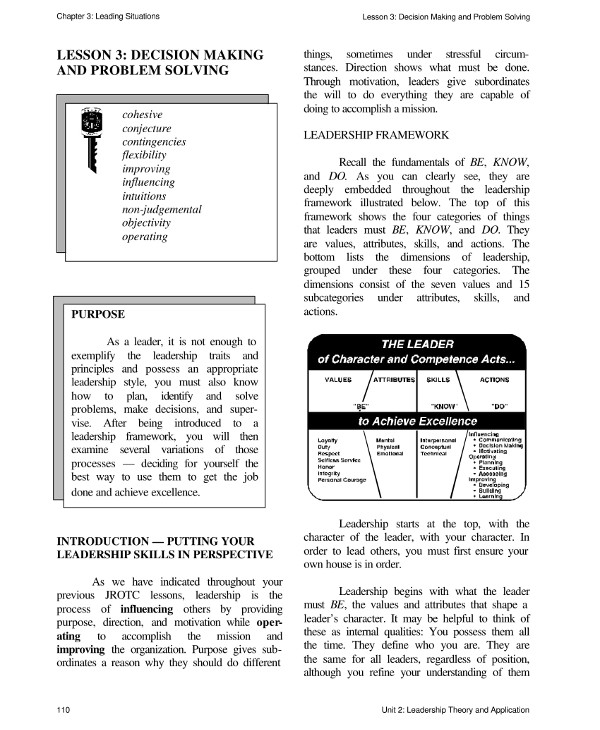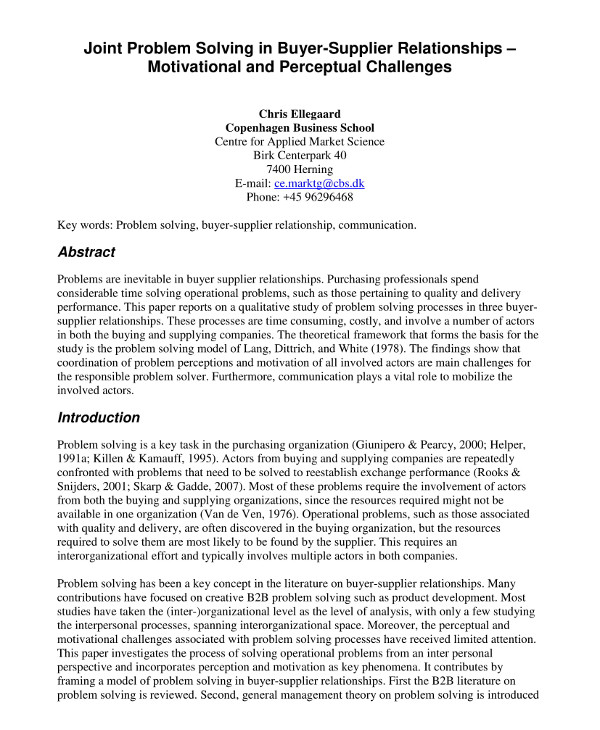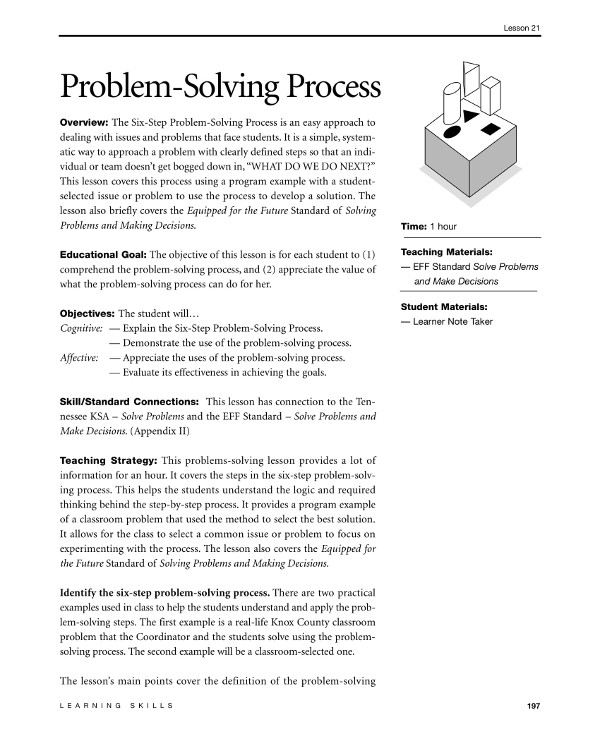11+ Business Problem Solving Proposal Examples to Download
All businesses face problems and threats, may it be about the management of the company, the operational requirements and policies that the workforce need to adhere to, or the way that the market reacts to corporate efforts and marketing activities. As a business entity, you need to ensure that you are always prepared when it comes to dealing with unforeseen circumstances so you can protect the sustainability and operational quality of your organization. If you want to present a specific solution to the problem that your business is currently facing, a business problem solving proposal is a document that can help you professionally and formally discuss your thoughts and recommendations.
Even if you can develop a business problem solving proposal on your own, it will be better if you are well-guided when it comes to formatting the document’s content. To help and guide you in the creation of your business problem solving proposal, do not hesitate to refer to the downloadable examples in PDF that we have listed in this post. You may also see problem statements.
Small Business Proposal Template
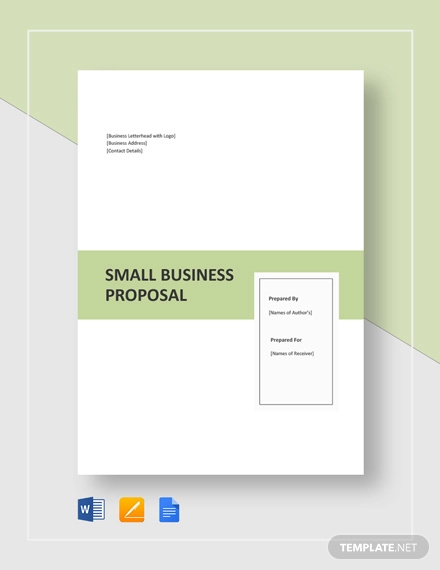
IT Business Proposal Template
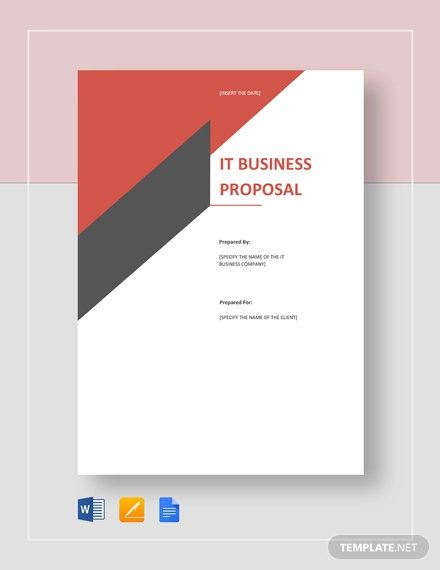
Retail Business Proposal Template
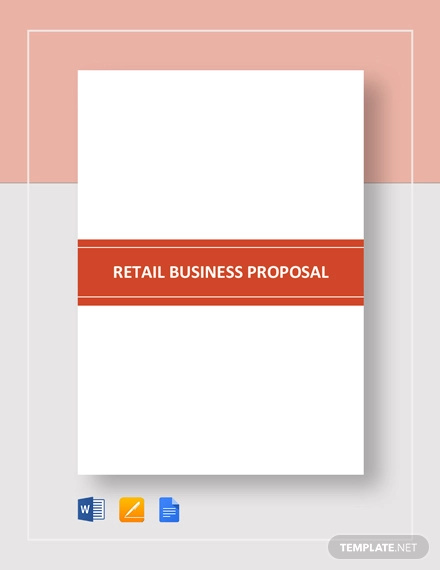
Business Problem Solving Proposal Template
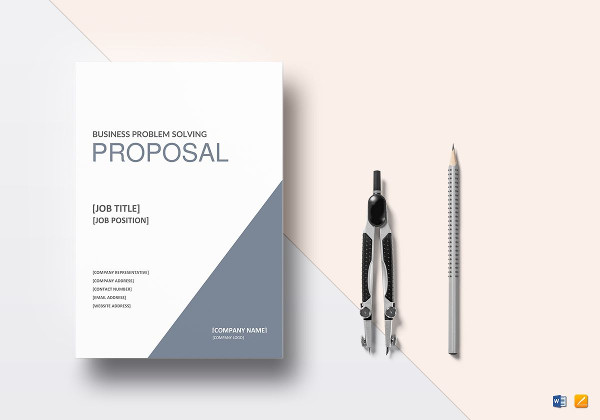
Proposal for Solving Business Problems Example
Vendor Approach to a Business Problem Proposal Example
Factors to Look Into When Creating A Business Problem Solving Proposal
There are different kinds of problems that businesses from different industries face on a daily basis. Even if problems can negatively impact the business, it is important for you to consider them as opportunities for you to develop your processes and learn more on how you can better your business and its areas. May it be long-term or short-term solutions that you would like to execute depending on the problem that you need to face, using a business problem solving proposal is always a good idea so that you can focus on the necessary steps that are needed to be implemented for you to solve a problem in the best way possible. Listed below are some of the factors that you must look into once you involve yourself and your team in the creation of a business problem solving proposal. You may also see proposal memo examples.
1. Know the approach or the methodology that you will use for problem solving. You need to list down all the steps that can guide your team when implementing the solution that you have in mind. This will allow you to ensure that your solutions can positively impact the management and all the other stakeholders of the business especially those that can be directly and heavily affected by the problem if untreated or unresolved. You may also see final year project proposal examples.
2. Identify the nature of the problem and how it can affect the business. You need to know the core of the problem’s existence so you can provide solutions that can eliminate the problem or lessen its impact to the business. The more information about the problem that you are aware of, the easier it will be for you to find ways on how you can maximize your efforts and resources when it comes to dealing with the problem at hand. You may also see proposal executive summary examples.
3. Be aware of the business areas as well as the stakeholders that can be affected by the problem that you would like to solve. The involvement of your workforce is very important as it can help your plans of action be realized in a timely and efficient manner. More so, knowing the entities and divisions that can be affected by the problem can help you measure the range of the things that you need to observe and look into. You may also see action research proposal examples.
4. Just like when making a professional business proposal, think of the technical aspect of the document. Know the format that you will use for your presentation, the length of your discussion, and the scope as well as the limitations of your problem solving proposal. Ensure that you will follow the guidelines and specifications of the business when deciding about these matters.
Business Problem Proposal Example
Business Problem Solving and Decision Making Proposal Example
Proposal for Business Intelligence Solution Based on Systems
What Is in a Business Problem Solving Proposal?
Making decisions for your business in terms of how it can solve a problem is very crucial. You have to think of different items so you can come up with a solution that will be best for the interests of your stakeholders. Having a thorough strategic plan and a set of solution options can help you a lot when it comes to this matter. If you want to create an outstanding business problem solving proposal, you have to ensure the completion and clarity of the details for your discussion. Even if there are a variety of ways on how a business problem solving proposal can be developed, here are some of the details and information that are usually found in a basic business problem solving proposal document:
- The title or cover page that can present the business problem solving proposal as a business document
- The cover letter or introduction about what the business problem solving proposal is all about. You may also see professional proposal examples.
- The objective or goal that you would like to achieve once the business problem solving proposal has been approved and its content implemented
- The proposal executive summary that can set the scope and limitations of the discussion within the document
- The analysis of the business problem that you would like to resolve which includes the reasons why the problem exists and the elements that trigger the problem’s occurrence
- The recommendations or solutions that you would like the business to consider so that it can solve existing problems that can affect its performance and/or operations. You may also see business requirements document examples.
- The problem solving method and steps that should be followed for the problem to be resolved accordingly
- The comparison of the method that you have selected with the other problem solving methods that you think are less effective in terms of providing potential results. You may also see short proposal examples.
- The specification and description of the workforce that you need to implement the solution which includes the team members’ abilities, skills, and other deliverable that are required to fulfill your objectives
- The benefits that the business and its stakeholders can experience or get if they will execute your solution. You may also see engineering project proposal examples.
- The estimates of the cost that is necessary to be covered so you can execute your proposed solution completely
- The timeline that you need to follow when implementing your solution to the problem including the proposed starting date of the solution execution, the time frames of all the activities that you will do, and the deadline in which results must already be observed. You may also see research proposal examples.
- The suggestions and other options that the decision-makers of the business can select from if they do not approve the initial solution that you have presented or selected
- Any other recommendations or notes that you would like your target audience to be aware of. You may also see budget proposal examples.
Proposal for Joint Problem Solving Example
Proposal for Problem Solving and Root Cause Analysis
Advantages of Using a Business Problem Solving Proposal
When making a proposal letter or a proposal document, you have to ensure that you will list down the benefits that all the stakeholders can get if they decide to accept or approve the proposal content. If you want to make sure that your business problem solving proposal can be appealing to your target audience, you have to come up with a list of the advantages that they can experience from the solutions that you are offering or proposing. To help you create this list, here are some of the advantages that using a business problem solving proposal can provide you with:
1. A business problem solving proposal can help you focus and give priority on the identification of the solutions that will best work for your business when it comes to dealing with the identified problem. It is important for you to consider the ability of the business to execute your plans as well as the resources that will be used for the solution implementation. Being aware of these items can help you ensure the realistic approach of solving the problem of the business. You may also see service proposal examples.
2. A business problem solving proposal can allow you to analyze the existing problem first before discussing the recommended solutions that you would like the business to consider. The specified document can help your target audience to be aware of the problem and the level or weight of its impact to the business. Being knowledgeable of these information can help you give more importance on why it is essential for your proposal to be approved. You may also see it proposal examples.
3. A business problem solving proposal can present the criteria and metrics that you looked into before finalizing your decision about the solution that you want to execute. Even if you will come up with several back-ups and options, it will still be best if you can persuade the business to select the solution that you think is the best and the most efficient among all the problem solutions that you have listed. You may also policy proposal examples.
4. A business problem solving proposal can make your problem-solving strategies become more precise. Always keep in mind that the initial solution that you have thought of will not always be the most effective or most appropriate. With the help of a business problem solving proposal, you can have a valid comparison of the solution options that you can incorporate in the problem-solving efforts of the business. You may also see coaching proposal examples.
Proposal For Solving Managerial Problem Example
Proposal for Business and Academic Problem Example
Problem Statements for Actual Proposals for Businesses
Tips in Developing a Business Problem Solving Proposal
A business problem solving proposal can serve as your guide if you want to disseminate information about the solution that you think is the best option for the business. It is critical to finalize a business problem solving proposal as it can affect the business as well as its operations and its relationship with its stakeholders. A few of the useful tips that you can refer to if you want to develop a functional business problem solving proposal include the following:
1. Use proposal templates and examples that can make your business problem solving proposal more presentable and well-formatted. You can also use the previous business problem solving proposals of your business as your references.
2. Incorporate tactics and strategies when writing the business problem solving proposal. Give focus to the items that matter and make sure that your pre-writing processes involve the proper outline that you can refer to when formatting the final document. You may also see advertising proposal examples.
3. Develop criteria and measures that you can use to weight the significance and effectiveness of your solutions. You can base these items in the questions that you would like to answer or the potential of your hypothetical solutions. Having metrics for assessment can help you select the best solution at hand. You may also see freelancing proposal examples.
4. Have a systematic approach on how you will present the discussion within your business problem solving proposal. Your final proposal must be clear and transparent so you can make sure that the business stakeholders can understand how your proposed solutions can resolve the problem. You may also see job proposal examples.
Ensure that you will remember the specifications that we have discussed in this post so you can be guided within the entirety of the development of your business problem solving proposal. More so, maximize the usage of our downloadable examples and allow these references to help you format your own business problem solving proposal appropriately. Download the available examples now and try to create an impressive problem solving proposal that your business can benefit from. You may also see sponsorship proposal examples.



